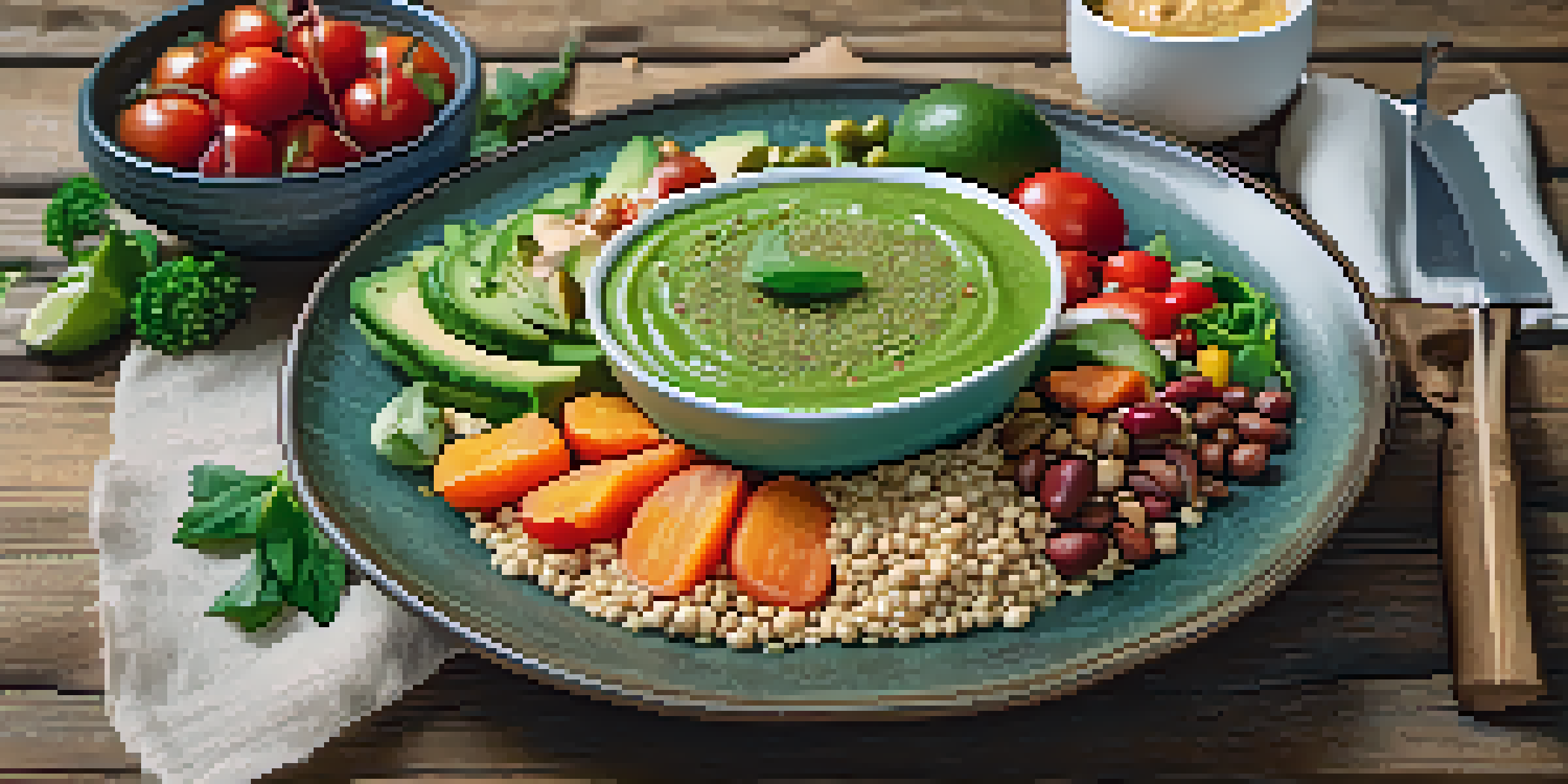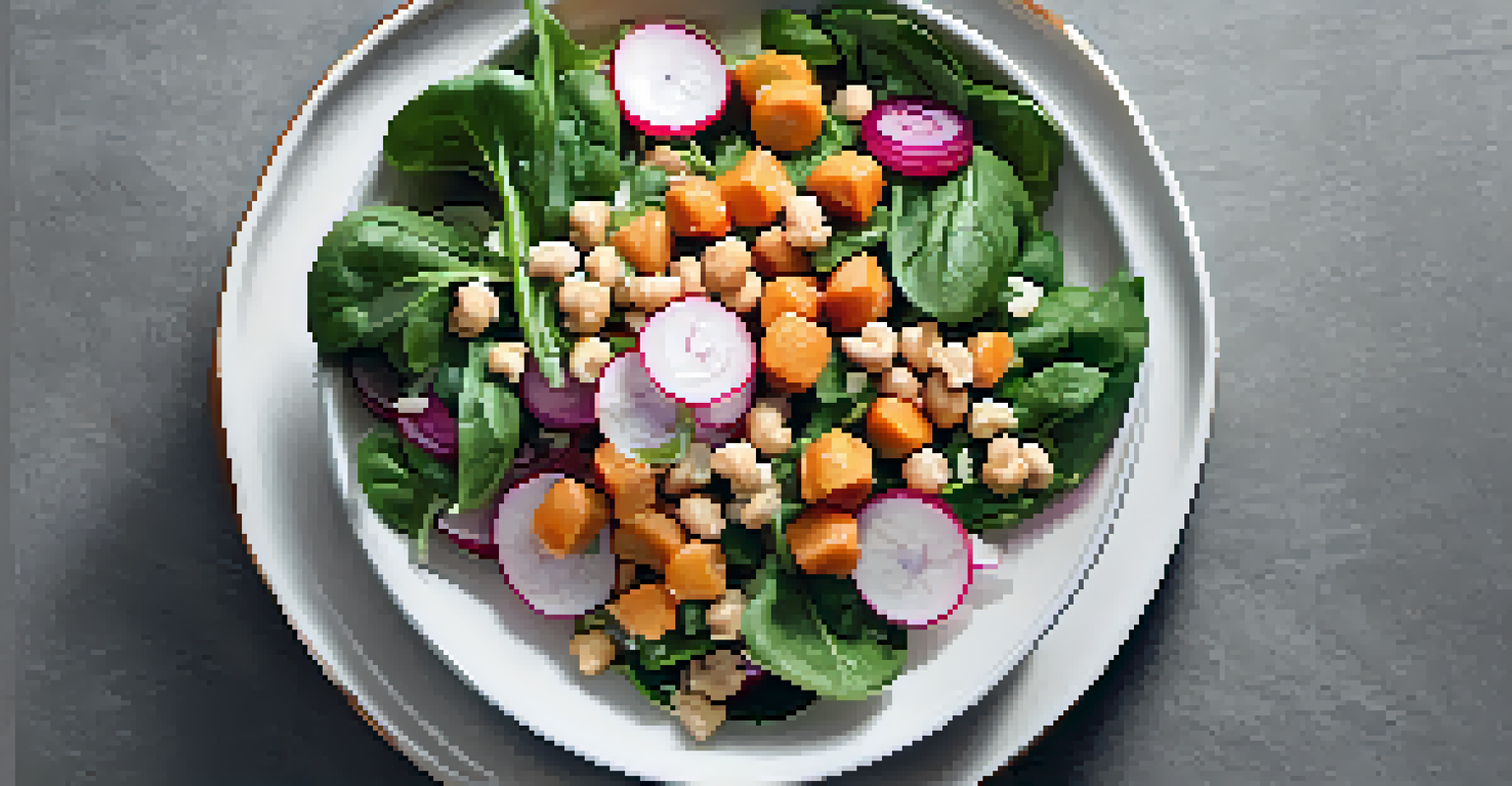Nutritional Aspects of Veganism vs. Vegetarianism

Understanding Veganism and Vegetarianism
Veganism and vegetarianism are two popular dietary choices that often get mixed up. While both exclude meat, veganism takes it a step further by also omitting all animal products, including dairy and eggs. This distinction is crucial because it influences not only food choices but also nutritional intake and health considerations.
Eating a plant-based diet is not only healthy, it's also a sustainable choice for the planet.
Vegetarians may consume dairy products and eggs, which can provide essential nutrients such as calcium and protein. On the other hand, vegans need to find alternative sources for these nutrients, making their dietary planning more critical. Understanding these differences is key to navigating each lifestyle effectively.
Both diets can support a healthy lifestyle, but they require different approaches to ensure all nutritional needs are met. Being informed about what each diet entails helps individuals make choices that align with their health goals and ethical beliefs.
Key Nutritional Components: Protein
Protein is a building block of our bodies, and both vegans and vegetarians can meet their protein needs through plant-based sources. Vegetarians have the advantage of including dairy and eggs, which are complete protein sources. In contrast, vegans must rely on combinations of foods like beans, lentils, quinoa, and nuts to achieve the same protein levels.

For example, a meal combining rice and beans provides a complete amino acid profile, meaning all essential proteins are present. However, vegans need to be more diligent in planning meals to ensure they’re getting adequate protein intake. This emphasizes the importance of understanding food pairings and inclusivity in meal planning.
Vegan vs. Vegetarian: Key Differences
Veganism excludes all animal products, while vegetarianism allows dairy and eggs, impacting nutritional needs.
Ultimately, whether you choose veganism or vegetarianism, there are plenty of protein-rich options available. The key is to diversify your sources to maintain a balanced diet.
Essential Vitamins: B12 and Iron
Vitamin B12 is a critical nutrient often lacking in vegan diets, as it is primarily found in animal products. Vegetarians can usually obtain sufficient B12 from dairy and eggs, making their diets somewhat easier in this aspect. Vegans, however, need to seek fortified foods or consider supplements to prevent deficiency.
The food you eat can either be the safest and most powerful form of medicine or the slowest form of poison.
Iron is another vital nutrient, and while plant-based sources like spinach and lentils are rich in iron, they contain non-heme iron, which is less readily absorbed by the body. Vegetarians benefit from heme iron found in meat, which is absorbed more efficiently. This difference means that vegans should pair iron-rich foods with vitamin C sources, like citrus fruits, to enhance absorption.
Being aware of these vitamins and their sources can help individuals on either diet make informed choices. Monitoring nutrient levels is crucial for maintaining overall health and preventing deficiencies.
Nutritional Fiber and Digestion
Both vegans and vegetarians enjoy a diet high in fiber, which is essential for digestive health. Fiber-rich foods, such as fruits, vegetables, whole grains, and legumes, are staples in both lifestyles. This high fiber content not only aids digestion but can also help in weight management by promoting a feeling of fullness.
For instance, a hearty vegetable soup loaded with beans and greens is not just nutritious but also incredibly filling. This satiety factor can be beneficial for those looking to maintain or lose weight. However, individuals new to these diets may need to gradually increase their fiber intake to avoid digestive discomfort.
Nutritional Awareness is Crucial
Both diets require careful planning to ensure adequate intake of essential nutrients like protein, B12, and calcium.
Overall, the emphasis on whole, plant-based foods in both vegan and vegetarian diets naturally leads to better digestive health. It’s a win-win for anyone looking to improve their gut health while enjoying delicious meals.
Healthy Fats: Omega-3 Sources
Healthy fats are crucial for overall health, particularly omega-3 fatty acids, which support heart and brain function. Vegetarians can easily obtain omega-3s from fish, which is a great source of these essential fats. Vegans, however, need to turn to plant-based sources like flaxseeds, chia seeds, and walnuts to meet their omega-3 needs.
For example, a vegan smoothie made with almond milk, flaxseeds, and berries can be a tasty way to incorporate healthy fats. It's important for vegans to be proactive in consuming these plant-based sources to ensure they receive adequate omega-3s. Incorporating variety in meals can help achieve this goal.
Both diets can support healthy fat intake, but understanding the sources and planning meals accordingly is essential, especially for those following a vegan diet.
Calcium Sources for Healthy Bones
Calcium is vital for bone health, and both vegans and vegetarians must find alternative sources to dairy. Vegetarians can enjoy milk, cheese, and yogurt, which provide a rich supply of calcium. Vegans, however, often need to rely on fortified plant milks, tofu, and dark leafy greens to meet their calcium requirements.
For instance, a delicious stir-fry with tofu and kale not only offers a tasty meal but is also packed with calcium. It's essential for vegans to read labels and choose fortified products to ensure they’re getting enough calcium. This highlights the need for careful meal planning to maintain bone health.
Health Benefits of Plant-Based Diets
Research shows that both vegan and vegetarian diets can lower the risk of chronic diseases and promote overall well-being.
In both diets, prioritizing calcium-rich foods is crucial for preventing issues like osteoporosis later in life. Understanding where to find calcium can empower individuals to make healthier choices.
Overall Health Benefits of Each Diet
Both vegan and vegetarian diets come with a plethora of health benefits. Research indicates that these diets can lower the risk of chronic diseases such as heart disease, diabetes, and certain cancers. The abundance of fruits, vegetables, whole grains, and legumes in both diets promotes a balanced intake of essential nutrients.
For example, individuals on a vegetarian diet may experience lower cholesterol levels due to the absence of meat, while vegans may benefit from an increased intake of antioxidants found in plant foods. These diets naturally encourage healthier eating habits, which can lead to improved overall well-being.

Ultimately, whether you choose veganism or vegetarianism, both diets can lead to a healthier lifestyle when planned thoughtfully. It's about making informed choices that align with your health goals.
Making Informed Choices for Your Lifestyle
Choosing between veganism and vegetarianism ultimately depends on personal preferences and health goals. Both diets can be nutritious and beneficial, but they require awareness and planning to meet all nutritional needs. It's essential to listen to your body and adjust your diet based on how you feel.
Consulting with a healthcare provider or a nutritionist can also provide tailored advice, especially if you're transitioning to one of these diets. They can help ensure you're getting all the necessary nutrients while supporting your health journey. Understanding your body's unique needs is key to making informed dietary choices.
In conclusion, whether you opt for veganism or vegetarianism, the most important aspect is to enjoy a balanced, varied diet that meets your nutritional requirements. Empower yourself with knowledge and take charge of your health through mindful eating.